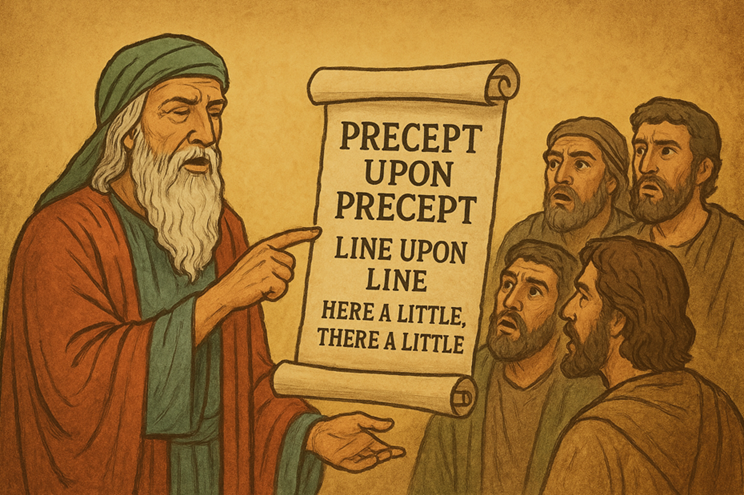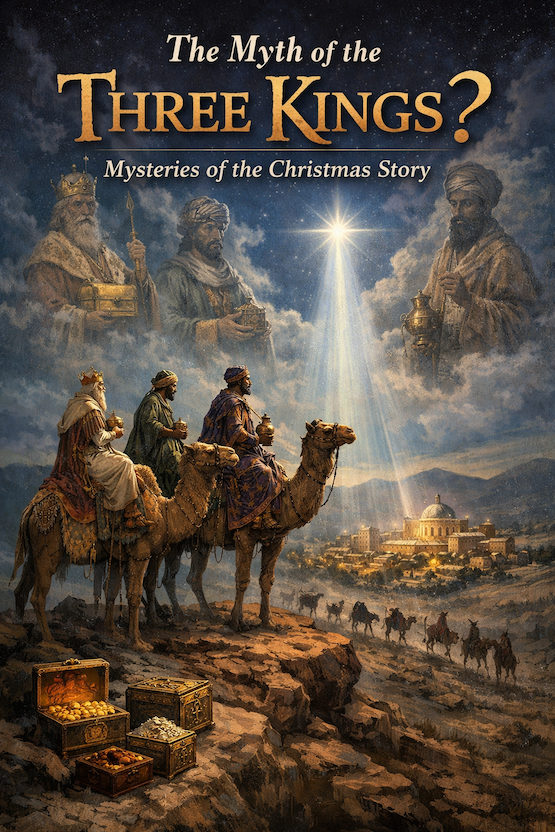By Tyron Devotta
Isaiah 28 contains one of the oddest phrases in Scripture: “precept upon precept, line upon line, here a little, there a little.” At first glance it sounds like a blueprint for careful Bible study — truth stacked neatly line by line. But in its original setting, it is actually a rebuke. The leaders of Judah were mocking God’s prophets, sneering that His words were simplistic, childish, nothing but “blah, blah, blah.” Because they treated God’s Word as nonsense, Isaiah warned that they would hear it in nonsense — “with stammering lips and another tongue” (Isaiah 28:11) — the foreign speech of their Assyrian conquerors.
Tongues
Centuries later, the Apostle Paul picked up this theme in 1 Corinthians 14. He quotes Isaiah to remind the Corinthians that uninterpreted speaking in tongues may impress the speaker but leave the listener confused. Just as foreign languages in Isaiah’s day were a sign of judgment, speaking in tongues without interpretation in Corinth risked making worship sound like gibberish. Paul’s point is that God’s Word is meant to bring clarity and life, not confusion. When the message is despised or misused, it becomes noise.
So on the one hand, Isaiah and Paul both warn: mock or mishandle God’s Word, and you risk turning it into babble. But on the other hand, there is a deeper truth: God’s Word often does come in fragments, in mysteries, in ways that are not straightforward — and this is by design, not by accident.
Revelation
The writer of Hebrews opens with the reminder: “In the past God spoke to our ancestors through the prophets at many times and in various ways, but in these last days He has spoken to us by His Son” (Hebrews 1:1–2). God chose not to hand down a textbook but to reveal Himself in pieces, through visions, laws, psalms, stories, and finally, through Jesus Christ. Isaiah’s phrase “line upon line, here a little, there a little” captures not only the mocking tone of Judah’s leaders but also the incremental nature of divine revelation itself. Truth is often given in steps, a little at a time, because too much all at once would overwhelm us.
Jesus confirmed this pattern when He told His disciples: “I have much more to say to you, more than you can now bear. But when He, the Spirit of truth, comes, He will guide you into all truth” (John 16:12–13).
Jesus was speaking to his disciples on the night before His crucifixion. This was part of His farewell discourse, spoken in the shadow of betrayal and suffering. The disciples were anxious and still struggling to understand His mission. Jesus knew they could not yet grasp the full weight of what was about to happen — the cross, the resurrection, and the coming mission to the nations.
Instead of overwhelming them, He promised the Holy Spirit. After His resurrection and ascension, the Spirit would guide them step by step, reminding them of His words and unfolding deeper truths as they were ready to receive them. The point is that God reveals Himself progressively — not all at once, but in ways His people can bear. What seemed hidden that night became clear through the Spirit’s guidance, leading the disciples to understand, teach, and eventually record the New Testament.
Parables
In another case when the disciples asked Jesus why He spoke in parables, He explained that the parables served a double purpose: they revealed the mysteries of the kingdom to those who were ready to receive them, but concealed the truth from those whose hearts were hardened (Matthew 13:10–17). To His disciples, the parables were keys that unlocked deeper understanding, because they were willing to listen and follow. But to the crowds who resisted God’s message, the same parables remained riddles — stories they could hear without truly grasping.
In this way, parables became both an invitation and a safeguard. They drew the humble further into God’s truth, while shielding the unwilling from greater judgment that would come from hearing and outright rejecting it. Jesus’ teaching method reflects God’s mercy and wisdom: truth is given in measure, according to the heart’s readiness. To the open, parables are windows into the kingdom; to the closed, they remain mysteries.
Revelation comes according to readiness. That is why He so often taught in parables — veiling truth until hearts were soft enough to receive it. As Paul wrote to the Colossians, the gospel was once “a mystery hidden for ages and generations, but now revealed… Christ in you, the hope of glory” (Colossians 1:26–27).
Scattered
What looks like fragmentation is actually God’s mercy. The Word comes as seed scattered in soil, not as a data dump. It unfolds across seasons, across prophets, across lives. We return to it again and again because its layers yield new fruit each time. What seems obscure at first ripens over time into insight, conviction, and transformation.
Put together, Isaiah and Paul show us the danger of despising or distorting God’s Word until it becomes nonsense, while Hebrews and Jesus remind us why God gives His Word in fragments and mysteries in the first place. The two truths belong together: God’s Word will sound like babble to the hard of heart, but to the humble it becomes a slow, steady unveiling of glory.
Slow
So for those who are confused or impatient with the Bible’s mystery, take heart: the slowness is purposeful. God is not withholding; He is cultivating. Line by line, precept by precept, parable by parable, He draws us deeper into Christ, the Word made flesh. And perhaps this is the paradox: the same Word that can sound like gibberish to some, would be enlightening to those who listen with the right attitude; for them the seed of eternal life.
I have been an investigative journalist in the mainstream media, not a Bible scholar, pastor, or preacher. So when I write about the Bible and Christianity, I do not do so with the sensitivities of a congregation in mind. My reflections may sometimes sound blunt, even maverick, and at times jarring. For this, I ask forgiveness.













